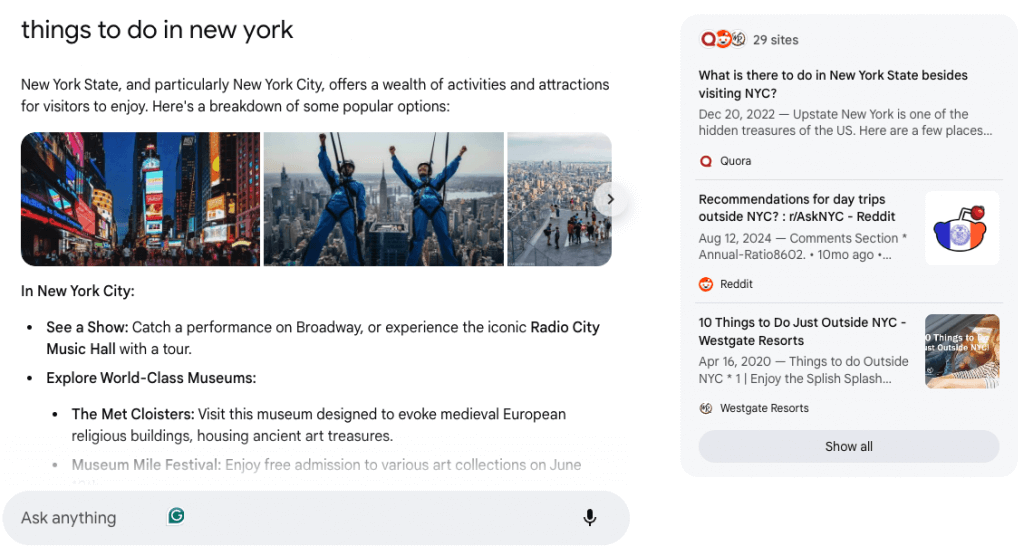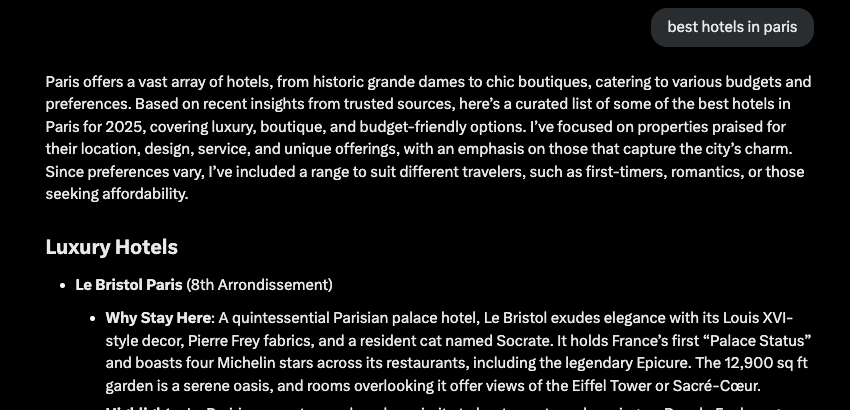Optimising travel brands for LLM and AI platform visibility
The travel industry is undergoing a dramatic shift with the rise of Large Language Models (LLMs) and generative AI. These technologies are transforming how travellers research, book, and experience trips, making it essential for businesses to adapt.
From personalised recommendations to AI-powered travel search, understanding how to optimise for these systems can give your travel brand a competitive advantage. This article examines the application of AI in travel to enhance the guest experience and drive ongoing revenue growth.

Understanding LLMs and their impact on search and travel
LLMs, including OpenAI’s GPT-4 and Google’s Gemini, are complex AI systems trained on vast and varied data sources. This extensive pre-training allows them to understand and generate human-like text, making them incredibly versatile across the travel industry.
Unlike traditional SEO, which relies on keyword matching, LLMs understand context, intent, and even user preferences to deliver highly relevant responses.
Travel companies can leverage these capabilities to enhance customer interactions across multiple touchpoints, including search engines and chatbots, thereby improving the overall customer experience. Travellers, in turn, can generate personalised itineraries tailored to their unique needs.
For travel businesses, this requires shifting away from traditional SEO tactics and embracing strategies that align with how LLMs retrieve and present information. Rather than focusing solely on keyword rankings, brands must ensure content is comprehensive, authoritative, and easily interpretable by AI.
LLM pre-training and its implications for AI in tourism
LLMs are pre-trained on expansive datasets that include travel reviews, booking platforms, and destination guides. The training enables them to handle queries like “What are the best family-friendly resorts in the Maldives?” or “How do I get from Paris Charles de Gaulle Airport to Disneyland Paris?”
According to a 2024 report by Skift, 57% of Millennials and Gen Z prefer personalised recommendations from AI-based systems, particularly for destination and activity suggestions.
However, it’s important to note that pre-trained LLMs do not continuously learn. They won’t reflect real-time updates such as changes to your opening hours or pricing. To avoid presenting outdated information, travel brands must ensure their content is consistently accurate and up-to-date.
Generative AI search
Search engines are now offering generative AI responses to travel-related queries. Instead of listing traditional search results, engines like Google increasingly display AI-generated summaries or itineraries.
For instance, a user searching “3-day nature itinerary for Costa Rica” might receive a full travel plan complete with images and map highlights.
A 2025 Adobe Analytics report found that between July 2024 and February 2025, U.S. travel and hospitality websites saw a 1,700% increase in visits from generative AI sources. An accompanying survey revealed that 29% of travellers used AI for trip planning, with 84% saying it improved their experience. These visitors also had a 45% lower bounce rate.
This shift highlights the necessity for travel brands to adjust their strategies and invest in AI readiness to stay competitive.
How are these recommendations made?
Generative AI travel suggestions are typically based on factors such as:
- User intent (e.g. budget travel, luxury getaways)
- Real-time data (e.g. pricing, availability)
- Authority signals (e.g. backlinks, expert reviews)
- Historical data (e.g. past bookings)
- Demographics (e.g. age, location)
- Social media engagement (e.g. shares, comments)
One prominent example is Expedia’s ChatGPT plugin, which uses conversational AI to suggest destinations, accommodations, and activities based on user preferences and behaviours.
In essence, these systems combine the user’s context, query, and conversation history with real-time web data to generate personalised suggestions.
Can the outputs of generative AI be influenced proactively?
While travel businesses can’t modify LLM algorithms directly, they can influence how these systems interpret and showcase their content.
LLMs favour content that is accurate, trustworthy, and relevant. Publishing high-quality, detailed information about your services across platforms improves your chances of being featured in AI-generated answers.
Key strategies include:
- Structured data: Adding schema markup (e.g. hotel listings, reviews) can help some AI platforms, such as Google and Bing, interpret your content more effectively.
- Clear content structure: Pages with poorly structured content are less likely to be deemed reliable by AI systems.
- Online reviews: Genuine customer feedback significantly influences sentiment analysis, a key factor in many LLM outputs.
- Presence on LLM training platforms: Participating in discussions on Reddit, Quora, and other influential forums can enhance brand visibility.

How to optimise for LLMs and generative AI in the travel industry
To increase your brand’s visibility in AI-driven platforms, follow these best practices:
Create high-quality, comprehensive content
Focus on EEAT: Experience, Expertise, Authoritativeness, and Trustworthiness. Ensure content is people-first, well-researched, and written by experts with clear credentials.
Emphasise semantic relevance
Move beyond keyword stuffing. Use related phrases and synonyms to build depth. For example, alongside “beach holiday”, include terms like “coastal getaway”, “seaside retreat”, and “oceanfront resort”.
Build authority and trust
Secure backlinks from respected publishers, highlight awards or testimonials, and share real case studies to improve your site’s credibility.
Optimise for conversational search
Answer common user questions in natural language. Include FAQ sections and Q&A-style content such as “What’s the best time to visit Kenya for a safari?” or “How do I travel from London to Edinburgh by train?”
Include rich media
Use high-quality images, videos, and maps accompanied by descriptive alt text. The media not only boosts UX but also improves your site’s machine-readability. Add infographics or charts where relevant.
Stay ahead of the AI curve
As generative AI continues to reshape how travellers search and engage with content, brands that adapt will gain a clear competitive advantage. By focusing on clarity, authority, and user-centred design, you’ll not only improve your visibility in AI-generated answers but also elevate your overall search presence.
If your travel brand needs expert support navigating this shift, SALT.agency is here to help. Our team of travel SEO specialists can guide you through the changes and ensure your content is optimised for both AI platforms and traditional search engines. Get in touch today to start future-proofing your SEO strategy.